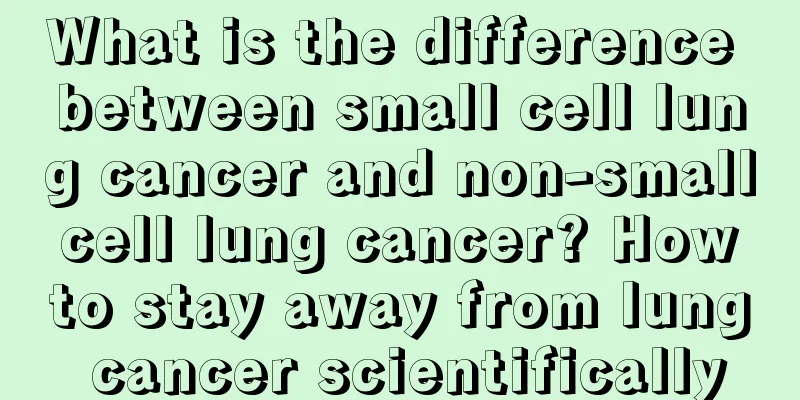What is the difference between small cell lung cancer and non-small cell lung cancer? How to stay away from lung cancer scientifically

|
Lung cancer is the number one killer because of its high incidence and mortality. Currently, there are 1.2 million new cases of lung cancer each year in the world, and one person dies from lung cancer every 30 seconds. Lung cancer is clinically classified into two types: small cell lung cancer and non-small cell lung cancer. Although there is only one letter difference between the two, the gap is huge. Differences between small cell lung cancer and non-small cell lung cancer Lung cancer is clinically divided into two major types: small cell lung cancer and non-small cell lung cancer. This distinction is very important because the characteristics and treatment options for these two types of lung cancer are completely different. 1. Small Cell Lung Cancer Small cell lung cancer (SCLC) accounts for about 15% to 20% of all lung cancers. Compared with non-small cell lung cancer, it is more malignant, develops rapidly, and metastasizes early, quickly, and extensively. When diagnosed, 60% to 70% of patients are already in the late stage. Small cell lung cancer is sensitive to radiotherapy and chemotherapy, and has a high cure rate in the early stage, but it is prone to secondary drug resistance and relapse. Since patients have hematogenous metastasis in the early stage and are sensitive to chemotherapy, the treatment of small cell lung cancer should be based on systemic chemotherapy, and surgery is contraindicated. Small cell lung cancer is sensitive to chemotherapy, but it is prone to recurrence and metastasis, so preventive cranial radiotherapy should be used with caution. There was a patient with small cell lung cancer who, after 6 courses of chemotherapy, achieved clinical recovery and had no visible tumors in the body, but died of severe brain atrophy due to preventive brain radiotherapy. 2. Non-small cell lung cancer Non-small cell lung cancer (NSCLC) accounts for 80% to 85% of all lung cancers, including squamous cell carcinoma, adenocarcinoma and large cell carcinoma. Squamous cell carcinoma is the most common, accounting for about 50%. Its cancer cells grow and divide relatively slowly compared to small cell lung cancer, and relatively speaking, spread and metastasis are also relatively late. For patients with non-small cell lung cancer, especially those in the early stage, surgical treatment is the first choice. After the lesion is removed, radiotherapy, chemotherapy and traditional Chinese medicine treatment are performed to consolidate the surgical effect. For patients with advanced cancer, especially when the cancer has spread and metastasized, surgical treatment cannot completely remove the malignant tumor. At this time, the patient's body is relatively weak and cannot withstand surgical treatment, so radiotherapy and chemotherapy should be used as the main method. How can we stay away from lung cancer? 1. Develop correct eating habits Epidemiological studies on lung cancer show that people who often eat fried food on the roadside have a three times higher risk of lung cancer than the average person. This is because a few roadside stalls may use low-quality oil, and the concentration of harmful gases in the oil smoke after repeated high-temperature heating is very high. Many cancers are caused by eating. Therefore, you should eat regularly, eat more fungi and beans, and drink less alcohol. 2. Control and ban smoking The mechanism of smoking causing lung cancer has been studied clearly. Epidemiological data and a large number of animal experiments have fully proved that smoking is the number one killer of lung cancer. Both we and society should take action. 3. Take good occupational protection Effective protective measures should be taken in mining areas where radioactive ores are mined to minimize the amount of radiation workers are exposed to. For workers exposed to carcinogenic compounds, various effective labor protection measures must be taken to avoid or reduce contact with carcinogenic factors. 4. Get enough rest If you don’t get enough rest, your immunity will decline, and you will be more susceptible to various diseases, including the terrible cancer. Sufficient sleep is particularly important in preventing lung cancer. No matter what your work and rest schedule is, even if you go to bed at two or three in the middle of the night, you should sleep at least 6 hours a day. |
<<: Methods to prevent early lung cancer and symptoms of early lung cancer
Recommend
How to care for cerebral infarction
We usually call cerebral infarction cerebral infa...
How to make yellow white shoes white
White has been a symbol of purity since ancient t...
Caffeine allergy
The clinical symptoms of caffeine allergy are mai...
What is the best treatment for thyroid cancer?
How to get the best treatment for thyroid cancer?...
The harm of carbon disulfide to humans
When people breathe normally, they do not absorb ...
What is cervical cancer virus
The cause of cervical cancer is still unclear. A ...
What are the taboos in acupuncture
Acupuncture is a very common way to treat disease...
Is rectal cancer contagious through feces?
Is the feces of rectal cancer contagious? Cancer ...
What should I do if I have bubbles in my mouth? Eat less fried food, grilling can relieve symptoms
I think blisters in the mouth are something that ...
The body's basal metabolism consumes calories
The human body consumes energy every day. The foo...
Which is more important, breast cancer staging or classification
Both the stage and type of breast cancer are impo...
What should I do if ultrasound detects pleural effusion?
Pleural effusion is a relatively common phenomeno...
What's missing from finger hangnails
Under normal circumstances, hangnails will not ap...
Causes, diagnosis and treatment of nosebleeds
Nosebleeds are something that many people have ex...
How to remove chickenpox scars more effectively
In fact, many people have had chickenpox, but if ...









